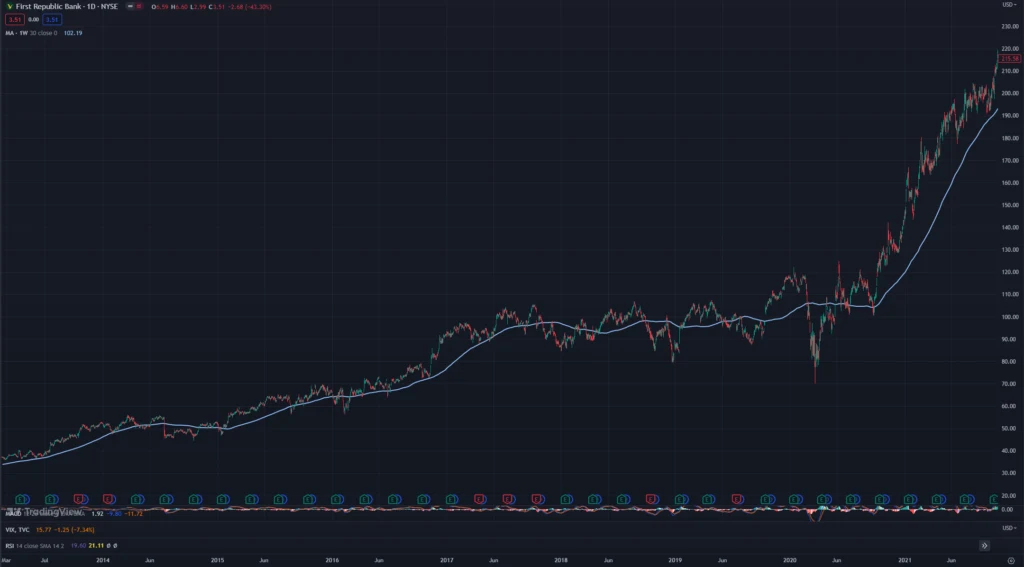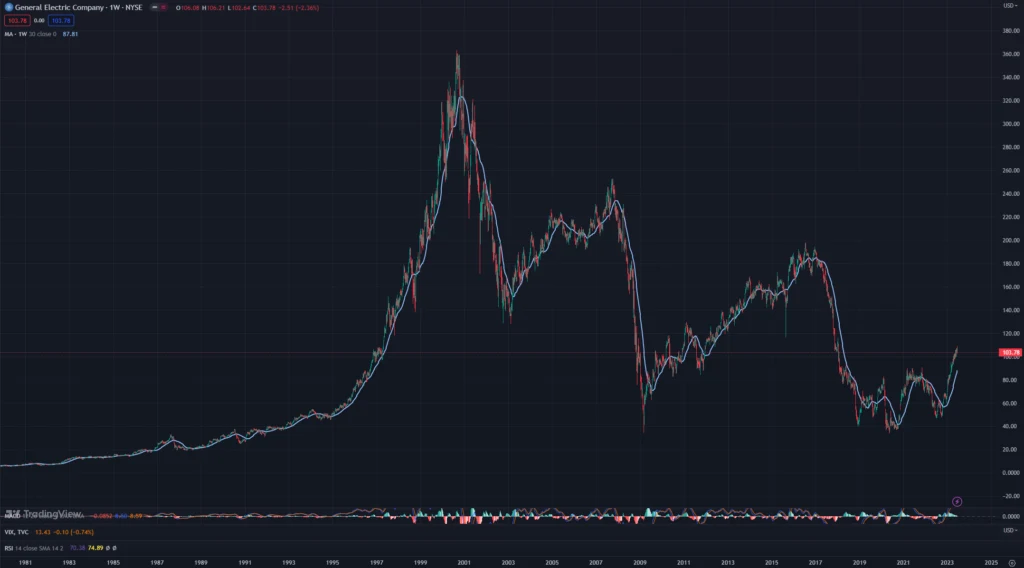If you ask yourself some questions, you might make financial decisions differently.
The Wall Street Journal did a piece looking at their employees’ investments when Silicon Valley Bank and First Republic collapsed.
I wanted to meditate on the piece to see if there is some unique company compensation that I am less aware of. There isn’t much. Most of the notes are below.
When I work on some client and prospect cases, sometimes I see a person with a large amount of his/her net worth in the company’s stock. They worked for a company whose stock did exceptionally well or that they have worked in the place for a long time.
That means that their working capital is tied to the company, their children, spouse and their hopes and dreams are all tied to the company.
Here is a company that did very well. When we graduated, many of us aspire to work in Accenture:

Here is the price chart of First Republic bank over the same period:

A long term chart of General Electric, which used to be a top ten S&P 500 stock for a long time, with many long time employees:

There are a few financial decisions to think about as the size of your company’s stock becomes an exceptionally large portion of your net wealth.
- Do you diversify from company stock, or do you still hold it?
- Some wealth builders never really think about the alternatives because of how busy they are.
- If not, the investment they tried to diversify into did worse than their company stock.
- Thus, they become reluctant to diversify or do it half-heartedly.
- Since some are in higher management, they buy into the culture of the company.
- They also believe they can “get out in time” if the situation becomes dire”.
- SVB and First Republic’s case study shows that the odds are not in their favour. The playbook is to shore up confidence. And that would mean the company always comes out to assure the public and staff (take a look at what First Republic did when SVB collapsed)
- When a stock price goes down, it is either some deep shit that can kill the company, or this is a good buying opportunity. A stock’ price correct heavily either due to broad market sell down or their own problems. But as an investor, buying more stock is voting that things will be okay and get better and selling means something is wrong, or this is getting too much for you.
- The company does not need to die like SVB. They could just massively lose their way and the total share return becomes worse and worse over a long period of time. Just look at the General Electric example above.
- Most of the people who stayed invested are either passive or think it will be alright. Not many people stay invested when they know they will lose all their money!
- But when you have your income, and net wealth in one company, can you make clear decisions?
Whether your company’s stock is doing well or not, being so concentrated is speculating your family and your own future with one company.
Two years ago, I wrote for Providend two illuminating questions to guide your investment decision making. Mohamed El-Erian’s two question makes you ponder about the investment aspect, but also the behavioural and financial planning aspect.
When you are this concentrated, you should think about the first question:
- I know in this uncertain world, no one can predict that the likelihood of mistakes will go up, no one wants to make a mistake but which mistake can I least afford to make?
- After going through 2008, we know that most mistakes are recoverable but what are the mistakes that I do not wish to make?
This question pushes you to ponder about your asset allocation, risk capacity and what you are not willing to lose.
It is a good question to think about.
Here are some bullet notes from the WSJ article:
- Even though First Republic Bank’s stock slumped 41% in 2022, employees increased their purchases (the shit only happened mostly in 2023). But top First Republic executives unloaded millions of dollars of company stock in the two months leading up to the March Banking panic.
- On the day Silicon Valley Bank failed, First Republic’s human resources head Mollie Richardson said at a meeting of HR employees that it was an excellent time to buy the stock through the employee-purchase program, according to people familiar with the matter. On March 17th, First Republic emailed workers to say that, employees’ demand for company stock had “exceeded the maximum number of shares available for purchase under the Employee Stock Purchase Program.”
- Their top employees are renumerated with a sizable percentage of their income in stock awards.
- Some employees ploughed more money into their company’s stock because of good performance and are assured of good performance.
- Employees of all levels can purchase their company shares at a 15% discount, up to a certain amount.
- 18% of Silicon Valley Bank’s stocks are held in retirement-plan assets, which is unusually high for public companies.
If you want to trade these stocks I mentioned, you can open an account with Interactive Brokers. Interactive Brokers is the leading low-cost and efficient broker I use and trust to invest & trade my holdings in Singapore, the United States, London Stock Exchange and Hong Kong Stock Exchange. They allow you to trade stocks, ETFs, options, futures, forex, bonds and funds worldwide from a single integrated account.
You can read more about my thoughts about Interactive Brokers in this Interactive Brokers Deep Dive Series, starting with how to create & fund your Interactive Brokers account easily.
